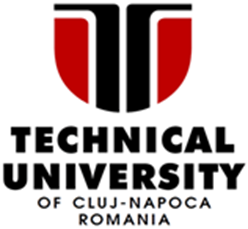The Technical University of Cluj-Napoca (TUCN), an “Advanced Research and Education University” as awarded with the Order of the Ministry of National Education no 5262/September 5th 2011, is today a tertiary educational institution having both tradition and national and international recognition. The Technical University of Cluj-Napoca comprises 12 faculties in the two academic centres, Cluj-Napoca and Baia Mare, as well as in locations, such as Alba-Iulia, Bistrita, Satu Mare and Zalau. The educational offer, aligned to the Bologna system, includes bachelor’s, master’s and doctoral programs, as well as continuous training programs. The university has 12 faculties, where more than 900 academic staff and more than 21,000 students carry out their activity.
The fields of study have a wide range, from engineering to architecture, fundamental sciences, socio-human sciences and arts. Also, within the Technical University, the Department for Continuing Education, Distance Learning and with Reduced Frequency organizes and conducts continuous education activities and programs, postgraduate courses, continuous professional development programs or courses or based on occupational standards.
The Technical University of Cluj-Napoca is concerned with the international exchange of scientific values, and this trend is found in the over 400 inter-university collaboration agreements or in the large number of student mobilities. Opening up towards the European and world space of education and research through a steady process of internationalization is one of the major objectives of the university.
Research is, along with education, the main priority of the Technical University of Cluj-Napoca. In all faculties of the university there are research structures, from collectives, groups and laboratories, to research centers and platforms. The performance anchored in the socio-economic environment, the international visibility and cooperation as well as the scientific novelty and interdisciplinarity are some of the characteristics of the research environment of the Technical University of Cluj-Napoca. Open research directions are oriented towards global priorities and perspectives: from the Information and communications technology to Renewable Energy and Ecology; from superconductivity, spintronics and nanomaterials, to management and robotics; from mechatronics and electrical engineering, to the automobile and the home of the future, or to urbanism and society. The Technical University of Cluj-Napoca, one of the 12 universities of “advanced research and education” in Romania, aims at engaging itself in producing outstanding scientific results and approaching interdisciplinary and multidisciplinary subjects. Furthermore, it strives to integrate the research results in the exchange of national and international values, to increase its national and international visibility, and also attract and create highly skilled human resources. Achieving these goals must strengthen its already established position as a university of “advanced research and education”, and the recognition of the Technical University of Cluj-Napoca as a center of excellence in scientific research with a high impact on the social and economic environment. Scientific research, by its creative nature, represents one of the most important methods both in teacher or researcher training and in educating university students in the spirit of innovation, irrespective of study level. In the Technical University of Cluj-Napoca basic and applied research, as well as innovation are promoted. The research topics cover the fields of engineering, science, and humanities.
Research is conducted at department level, predominantly in over 70 accredited research structures. The new research strategy aims at creating self-sustainable interdisciplinary and multidisciplinary structures capable of outstanding scientific achievements, integrated within a multidisciplinary research institute. The coordination of the scientific research is performed by academic staff experienced in research, and especially by PhD advisers relying on the broad involvement of the faculty, the young researchers, and the students. Research teams enjoy the freedom of choosing their research topics, but their activities are in line with the national and international policy comprised within the strategy of research – development – innovation.

